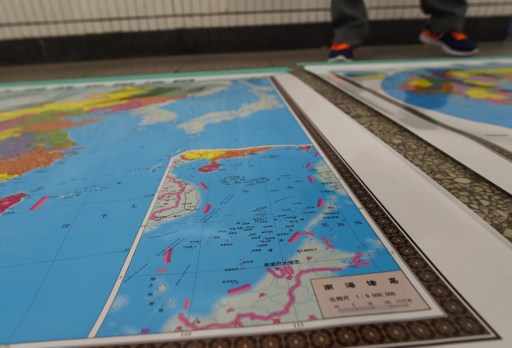
In this photo taken on June 15, 2016 a vendor stands behind a map of China including an insert with red dotted lines showing China’s claimed territory in the South China Sea, in Beijing.
China claims nearly all of the South China Sea — a vast tract of water through which a huge chunk of global shipping passes. The Philippines, Taiwan, Brunei, Malaysia and Vietnam have competing claims to parts of the sea, which is believed to harbour significant oil and gas deposits. AFP
The South China Sea territorial disputes have proved to be a divisive issue for Asean, and the arbitration ruling this week on the case brought by the Philippines will be no different, analysts have said.
While it is important for Asean to come up with a statement in support of the verdict to nudge claimant states towards observing international law, said political analyst Richard Heydarian, he does not expect a consensus on this. Cambodia last month called the arbitration a “political conspiracy” and is likely to oppose a statement.
It was Cambodia and Laos – two Asean states reliant on Chinese aid and trade – that reportedly scuppered an Asean joint statement last month that voiced “serious concerns” over developments in the South China Sea and called for peaceful resolution of disputes in accordance with international law. The statement was released after a special meeting between Asean and China, and retracted hours later.
In 2012, Asean failed for the first time to issue a joint communique after its foreign ministers’ meeting following disagreement over whether to include mention of the disputes.
After last month’s “diplomatic fiasco,” as some analysts call it, there is little expectation there will be an Asean joint statement on the arbitration ruling due out on Tuesday. Instead, it is expected that some Asean members such as Singapore, Indonesia, Malaysia and Vietnam will issue their own statements.
Still, “Asean cannot skirt the issue and will duly issue a statement,” said Dr. Tang Siew Mun, who heads the Asean Studies Centre at Iseas-Yusof Ishak Institute. However, it will be a delayed response at the Asean foreign ministers’ meeting later this month in their joint communique affirming the rule of law and peaceful settlement of conflicts.
While analysts agree that the arbitration tribunal’s ruling will test Asean’s unity, they do not think that the situation is dire.
“Asean’s unity does not rest solely on its response to the… ruling,” said Dr. Tang.
Professor Thitinan Pongsudhirak of Chulalongkorn University in Bangkok said Manila would help Asean-China ties by backing off, even if the decision is in its favor.
“Ultimately, the ruling should pose an opportunity for China and Asean to mend their rifts by working together with a common set of rules, namely, the Code of Conduct,” he said, referring to ongoing talks on a legally binding set of rules to manage disputes in the South China Sea.
RELATED STORIES
Japanese judge’s tribunal choices biased—China
Q&A: Landmark ruling on South China Sea
RELATED VIDEOS

